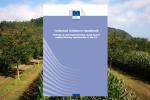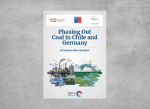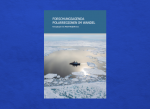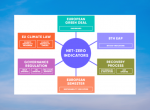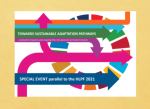Ecologic Institute Newsletter No 225 – June 2021
Climate and Health – Our 25th Anniversary International Fellowship Crowdfunding Campaign
- Ecologic Institute Newsletter
Climate and Health – Our 25th Anniversary International Fellowship Crowdfunding Campaign
Dear Readers,
For the past few months, we at Ecologic Institute have been celebrating our International Fellowship program. This program started in 2002 and has brought many interesting and dynamic individuals to the Institute over the years, numerous of which remain staff members to this day.
As 2021 is our 25th anniversary year, we have created a special 25th Anniversary Fellowship for a young, international scientist who specializes in health and climate. For this purpose, we have started a crowdfunding campaign to create stronger visibility for this program and garner support within our network and beyond. Health and the quality of our environment are closely intertwined. Ecologic Institute’s work in this area lies at the interface of environmental and life sciences as well as social and political sciences. The 25th Anniversary Fellow will bring a fresh perspective to this vital field, building on our belief that working together across borders and disciplines is critical to finding solutions. This is an opportunity for a young scientist to spend 12 months in Berlin and to collaborate with our transdisciplinary team on various exciting projects.
This edition of our newsletter highlights some of our recent work on climate issues (among other topic areas) including sustainable mobility, carbon farming mechanisms, international coal phase-out as well as the precautionary principle, all of which have implications for human health. We invite you to have a look at the articles in this edition, which may serve to provide an idea of the wide spectrum of topics our International Fellows can become involved in.
To learn more about our crowdfunding initiative, please visit our crowdfunding space or read more about this exciting initiative. We are very close to securing 75 per cent of funding and delighted for any and all support that takes us to the finish line.
Happy reading,
Jennifer Josenhans
Setting up and Implementing Result-based Carbon Farming Mechanisms in the EU – Technical Guidance Handbook
How can result-based payments be designed to support the scaling up of agricultural practices that reduce emissions and deliver robust carbon removals? A technical guide for setting up such payments has been published by DG Climate Action. Ecologic Institute co-wrote the guidance with its partners IEEP and COWI. The handbook is available for download.
Potential of Other Legal Areas to Achieve the Objectives of the Water Framework Directive – Study
Germany has so far failed to achieve the various objectives of the Water Framework Directive. This study by Ecologic Institute analyzes the potential of areas of law besides the water law to achieve the objectives of the Water Framework Directive. It focuses on mercury emissions from coal-fired power plants, renaturation of water bodies, water protection in the approval procedure for medicinal products for human use, the input of plant protection products into water, watercourse development in sectoral planning, compliance of hydroelectric power plants with water protection standards and the deficits in the structure of the Common Agricultural Policy. The study is available for download.
Analysis of Microplastics – Status Report
This status report was prepared within the framework of the cross-cutting issue 1 "Analytics and reference materials" of the research focus Plastics in the Environment. It summarizes the contents of the project discussions and coordination within the cross-cutting issue. The organization of this ongoing process of development or elaboration has been supported by several events between 2018 and 2020. The status report is available for download.
Pathways for Sustainable Mobility in Lower Saxony – Analysis
For Germany to reach its climate targets, new ways of thinking about mobility are essential. For the federal state of Lower Saxony, the mobility transition is particularly challenging due to the important role cars play in the region. The report "Pathways to Sustainable Mobility" (WenaMoNi) analyzes in detail where Lower Saxony stands and proposes the next steps. Ecologic Institute analyzed the legal framework and identified key actors promoting electric and hydrogen-based mobility. Katharina Umpfenbach and Ricarda Faber compared the existing policy instruments to best practices in other countries and to recommendations from science. The analysis shows that a policy approach that is built on subsidies, which has been favored so far, must be supplemented by pricing instruments if climate targets are to be reached. The analysis is available for download.
Phasing Out Coal in Chile and Germany – Analysis
Both Germany and Chile have decided to phase out coal in order to slash greenhouse gas emissions and to modernize the power sector. In a new publication, Agora Energiewende compared the experiences of both countries to distill lessons for policymakers navigating the challenges of exiting coal in their own countries. Ecologic Institute contributed to the case study on the German coal phase-out. It looked at the increasingly conflicted position of coal in the country's energy transition, the role of the coal commission and the process leading up to the coal phase-out decision. The analysis was done in support of the working group of the Chilean-German Energy Partnership.
Absolute Reduction in Resource Use – Report
In its 2016 circular economy package, the Netherlands set itself the goal of establishing a fully circular economy by 2050. By 2030, the use of minerals, fossil raw materials and metals is to be reduced by 50%. In this article, Susanne Langsdorf and Laurens Duin analyze the Dutch targets and program for a circular economy. The report is available for download.
Changing Polar Regions – Research Agenda
Germany's polar research activities contribute to numerous initiatives and include links to climate and biodiversity protection. To prepare for future challenges and address the most pressing issues, the Federal Ministry for Education and Research launched a process to develop a new polar research agenda. On 19 May 2021, the steering group of the agenda process handed over the concept paper on the "Changing Polar Regions", which was developed by over 100 experts, to the ministry. Arne Riedel, Arctic Coordinator at Ecologic Institute, was a member of the steering committee and coordinated the drafting of the Chapter on "Human Impacts on Ecosystems in the Arctic". The research agenda is available for download.
Could the "Conference on the Future of Europe" Actually Help Fix Climate Change? – Article
The Conference on the Future of Europe is now in full swing. This political process could become a milestone in EU climate policymaking – provided that its recommendations are specific and focus on the EU's ability to act, writes Nils Meyer-Ohlendorf in the EU Observer. He makes three proposals on how the conference could become a success for EU climate policies. The article is available online.
Nine Case Studies on the Application of the Precautionary Principle – News
The Precautionary Principle enables authorities to take precautionary measures by means of pre-damage control when it is scientifically plausible but uncertain that a new technology or product may cause harm. The project "REconciling sCience, Innovation and Precaution through the Engagement of Stakeholders" (RECIPES) aimed to put forward ideas on how to align the precautionary principle with the goals of innovation to ensure sustainable and safe solutions while fostering social awareness and responsibility in the EU in the fields of research and innovation. The nine case studies aimed to understand and explain the potential differences in the application depending on the topic and the context. For each case study, researchers prepared a report, a fact sheet and a short video. Furthermore, the RECIPES project compared the different case studies and identified complexities and controversies surrounding the application of the precautionary principle in the different cases in a report. The project results are available online.
Environmental Policy: Helping or hindering NbS? – Presentation
Climate change, biodiversity loss and ecosystem degradation are linked and interdependent challenges need to be addressed in an integrated manner. Synergies can be enhanced by building on the multifunctionality and multiple benefits of biodiversity and healthy ecosystems, captured under Nature-based Solutions (NbS). These topics were explored in the session "Nature as a solution: For resilience, mitigation and sustainable development" during the 5th European Climate Change Adaptation Conference (ECCA2021). Ecologic Institute's McKenna Davis was a keynote speaker, presenting on the EU and global environmental policy landscapes and their role as a help or hindrance to NbS uptake. The full agenda of the event and McKenna Davis's PowerPoint presentation are available for download. A recording of the session is available online.
Foreign Minister Honors Role of German Arctic Research – News
On 20 May 2021, the foreign ministers of the eight Arctic states convened in the Arctic Council, the most important forum for environmental protection and cooperation in the region since its beginnings 25 years ago. At this meeting, Russia took over the chairmanship in the Council for the next two years from Iceland. Germany has an observer status in these meetings. German Minister of Foreign Affairs, Heiko Maas highlighted in a video message the contributions of German experts to the working groups of the Arctic Council and beyond with their research. Ecologic Institute has participated since 2013 in the German government's "Arctic Dialogues" and contributed (among other Arctic projects) to the development of Arctic environmental policy guidelines. Currently, the Institute's Arctic Team is working on marine protected areas in the region and on the participation of people in the Arctic.
Measuring Progress towards Climate Neutrality – Online Discussion
Across EU policy, a range of processes are ongoing to develop methods to assess progress towards climate neutrality – but there is no integrated set of "net-zero indicators" being developed to do the job. A proposal for such monitoring methodology has been developed by Ecologic Institute and IDDRI – commissioned by the European Climate Foundation – to provide a stimulus for debate on how progress measurement could be done. On 24 June 2021, this event will present the main insights and discuss them with a range of experts from different institutions. Please register to attend.
How Can Advisory Bodies Effectively Support Climate Policy? – Report Launch and Online Discussion
A recent analysis commissioned by the European Environment Agency mapped the current landscape of climate advisory bodies across 33 countries, developed a typology and looked at the workings of independent scientific councils in more detail. It also identified key characteristics of respective national climate policy governance systems in these countries. On 2 July 2021 from 11 to 12:30 CEST, the main results from the report will be presented and its insights discussed with a range of experts from different institutions. This event is organized by Ecologic Institute for the European Environment Agency. Sign up below to attend.
Towards Sustainable Adaptation Pathways – Online Discussion
Register now! On 7 July from 18:00 to 19:30 CEST, Ecologic Institute, on behalf of the German Environment Agency, invites you to join an online high-level panel discussion on Sustainable Adaptation Pathways. We are looking at integrative actions and good practice examples jointly targeting the SDGs, the Paris Agreement and the Sendai Framework. Join us for a debate with key experts that bring diverse experiences from different regions of the world to the table. The event will be live-streamed via Zoom. Please register to attend.
Contents
- Setting up and Implementing Result-based Carbon Farming Mechanisms in the EU – Technical Guidance Handbook
- Potential of Other Legal Areas to Achieve the Objectives of the Water Framework Directive – Study
- Analysis of Microplastics – Status Report
- Pathways for Sustainable Mobility in Lower Saxony – Analysis
- Phasing Out Coal in Chile and Germany – Analysis
- Absolute Reduction in Resource Use – Report
- Changing Polar Regions – Research Agenda
- Could the "Conference on the Future of Europe" Actually Help Fix Climate Change? – Article
- News
- Nine Case Studies on the Application of the Precautionary Principle – News
- Environmental Policy: Helping or hindering NbS? – Presentation
- Foreign Minister Honors Role of German Arctic Research – News
- Register Now!
- Measuring Progress towards Climate Neutrality – Online Discussion
- How Can Advisory Bodies Effectively Support Climate Policy? – Report Launch and Online Discussion
- Towards Sustainable Adaptation Pathways – Online Discussion

